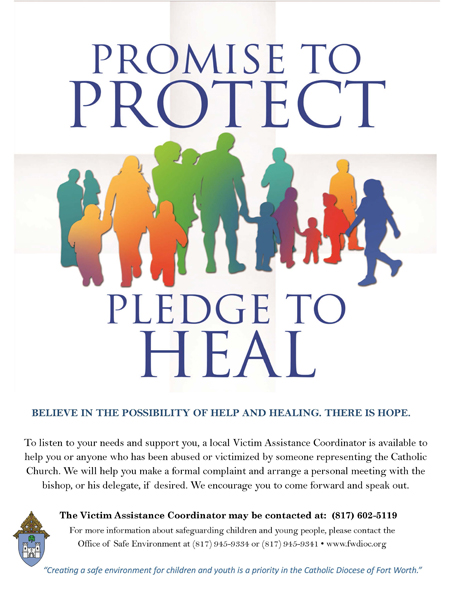Advances create a safer environment
FORT WORTH — Protecting the most vulnerable is a top priority for the Church, and with an updated, streamlined educational program being implemented for the Diocese of Fort Worth, achieving that objective will be a little easier.

The Safe Environment program includes training sessions for preschoolers through adults, offering instruction in the protection of children, youth, and vulnerable adults. With April being National Child Abuse Prevention Month, timing for educational outreach about the improved program couldn’t be better.
Child abuse and neglect know no boundaries, affecting children of every age, race, and income level. According to recent statistics, one out of every four girls and one out of every six boys are sexually assaulted before they turn 18. In 2016, concerns about the safety and well-being of more than 7 million children were reported to Child Protective Services.
“When you’re a community, you look out for each other. That is why we have this training,” said Richard Mathews, director of Safe Environment. “We teach people to not be bystanders and to say something.”
Mathews said protecting others is what Christ instructed His Church to do.
“It goes to our Catholic faith. We are our brother’s keeper. We have to love our neighbor as our self,” he said. “This gives us the opportunity to demonstrate our faith, walk with Christ, imitate Christ, and focus on protecting the most vulnerable.”
Since the program began in 2002, it has seen expeditious growth. Last year, 4.5 million children in Catholic schools and parishes in the United States received the training, and the Diocese of Fort Worth educated 26,595 children in the program, which teaches children how to stay safe from abuse.
Last year, the Diocese of Fort Worth also trained and processed criminal background checks on 27,498 volunteers, 946 educators, 942 employees, 127 priests, 75 deacons, and 41 candidates for ordination.
A new program will streamline the process, allowing for even more effective outreach. Improvements include live training, as opposed to a web-based curriculum, to provide a more interactive session. A more accurate database will help program coordinators interact with those who have taken the training, offering reminders about renewals before training certificates expire and making sure all the background checks are current.
The program will have a strong social media push for awareness. Posters in English, Spanish and Vietnamese have been delivered to parishes and schools with information about child abuse and resources to call for help.
“Just like terrorism and domestic violence, we can’t take a bystander role. We need to know what to look for, whether it’s physical, social, or emotional abuse,” Mathews said. “We need to make sure the community knows the warning signs so we can protect children and vulnerable adults.”
Children who suffer abuse or neglect have an increased risk of depression and suicide attempts, substance abuse, developmental disabilities and learning problems, social problems, teen pregnancy, lack of success in school, domestic violence, and chronic illnesses including heart disease, cancer, and lung disease.
“I don’t think people understand the effects of child abuse. We tend to think, ‘They’ll get over it, they’ll get past it,’ but the trauma suffered by children impacts generations,” Mathews said.
Nancy Mitchell, safe environment analyst, said everyone involved with streamlining the improved program has been working relentlessly for the past year and a half.
“It’s amazing how many people in the diocese are anxious to get this right, everyone is trying so hard, and that’s really impressive,” she said.
Bishop Michael Olson has said the requirement for in-depth renewal is “designed to safeguard children and young people and to protect all members of the diocesan community in parishes, schools, and ministries.”
“We share a great responsibility to understand the nature of abuse and the steps we must take to establish and maintain safe, holy, and faith-affirming environments,” the bishop said.
Rollout for the upcoming program will be later this year, with facilitator training in June and July, and the program starting in parishes and schools by August and September.
